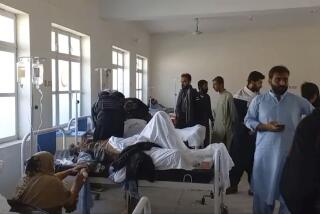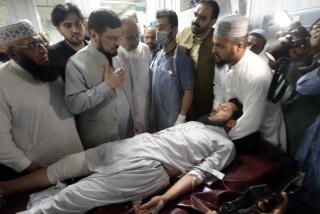Musharraf hopes meetings will diffuse dissension
(RealVideo and QuickTime)
ISLAMABAD, Pakistan — President Pervez Musharraf is scheduled to begin a series of hastily arranged meetings with Pakistan’s mainstream political parties Tuesday in an effort to contain pressure on his military government generated by the ongoing U.S.-led airstrikes in neighboring Afghanistan.
Officials in the presidential office said Monday that Musharraf had extended invitations to representatives of all major parties, including the faction of the Pakistani Muslim League loyal to former Prime Minister Nawaz Sharif. Musharraf deposed Sharif in a bloodless 1999 coup.
He has no plans to meet with the leaders of religion-based parties, which have formed the core of the anti-American, anti-government street protests held here since the United States launched attacks on Afghanistan in the wake of the Sept. 11 terrorist attacks.
The meetings come amid a discernible shift in the public mood in Pakistan during the past 10 days, during which the government has sensed that mainstream opinion is beginning to turn against Musharraf’s decision to back the bombing campaign.
As the airstrikes have continued and civilian casualties have grown, Pakistanis have spent their evenings watching gruesome television footage from the Arab network Al-Jazeera and waking up to headlines such as one in Monday’s Pakistan Observer that read: “Children Among Scores Killed in U.S. Attacks.”
There also has been a sharp increase in the number of public protests against the attacks. In a speech to the nation last month shortly after throwing his support to the United States, Musharraf said he expected demonstrations, but only among the extremists and fundamentalist religious parties that he believed represented about 15 percent of the population.
Initially, Musharraf’s projection appeared correct. Protests were far smaller than expected, and the broad stream of the Pakistani public appeared ready to tolerate a brief bombing campaign in return for an end to heavy sanctions and international isolation over the country’s nuclear weapons program.
But the government’s main worry now appears to be the far quieter shift they believe is under way within the vast “silent majority.”
“The extremists’ behavior has been quite stable and consistent,” Interior Secretary Tasneem Noorani said in an interview. “Their stand is clear. They will protest in various forms and will continue to do this.
“The significant change is the change of mood of the other 85 percent,” he added. “Now the bombing has gone on for 22 days, (and) it’s obviously taking its toll on the vast silent majority. This is going to be difficult to control as the (U.S. air) campaign goes on.”
The number of protesters has grown, and there have been acts of armed violence. On Sunday, 15 Christians and a church security guard were slain in the town of Multan, about 200 miles south of Islamabad, and a bus bomb killed three people in Quetta, the provincial capital of Baluchistan.
There are signs that the U.S.-led military action has gone beyond what Musharraf believed he had signed on to. At a news conference with German Chancellor Gerhard Schroeder on Sunday, he said the campaign should be “short and targeted.”
The country’s large political parties, such as the Pakistan Muslim League and the Pakistan People’s Party of former Prime Minister Benazir Bhutto, could mobilize a sizable chunk of the country’s mainstream. To head off a potentially serious threat to stability that would be posed if mainstream and religious parties joined forces, Musharraf might offer them a deal, some observers believe: Stay off the streets in return for an accelerated timetable for a return to civilian rule. The general had promised in August that nationwide elections would be held in October 2002, just before the third anniversary of his coup.
There are other signs that opposition to Musharraf’s pro-U.S. stance is hardening, including:
The normally fragmented religious parties have begun to show a more united front in their protests. For example, the biggest of these organizations, Jamaat-i-Islami, has staged large peaceful anti-government rallies in recent days, despite the fact it had earlier shown little interest in supporting the Taliban. Anis Ahmad, dean of the social sciences faculty at the International Islamic University in Islamabad, said in an interview that low-key protests attract a broader spectrum of participants.
Pakistani political parties, both religious and secular, meeting within the framework of an organization known as the Alliance for the Restoration of Democracy, recently agreed on two points: All parties should be involved in organizing future anti-government rallies, and Musharraf does not represent the people of Pakistan.
Slogans and placards carried at public protests, which previously focused narrowly on the bombing campaign, are targeting Musharraf and his government for supporting it.
In other developments Monday, Muslim religious leaders across Pakistan condemned Sunday’s slaughter at a Christian church in the Punjabi town of Bahawalpur.
At least 100 representatives of Muslim religious organizations joined 5,000 mourners at the funeral service for the victims, which was held outside the desecrated sanctuary, said Father James Channan, the head of the Dominican order in Pakistan, which runs the church.
Local Muslim shops in town as well as the local bazaar closed for the day.
“This was a sign of solidarity with Christians, it was a sign of mourning and a sign of condolence,” Channan said.
The dead were all Protestants except for the Muslim security guard, who was killed by the assailants before they entered the church. St. Dominic’s Church, where the shooting occurred, is Catholic, but was being used by Protestants because they had no other place of worship.
Lethal sectarian violence is far more common between practitioners of rival Muslim sects here than between Muslims and Christians.
On the diplomatic front, Lakhdar Brahimi, the recently appointed U.N. special representative for Afghanistan, gave a modestly optimistic prognosis for a new government to replace the country’s fundamentalist Taliban rulers.
“Governments seem to understand that the time for compromise and the time for allowing the people of Afghanistan to work out some kind of arrangement for themselves is there, and they will cooperate with us to achieve that result,” said Brahimi, who arrived in Pakistan late Sunday night for a round of meetings.
With little agreement about how to help Afghanistan form a government and recover from the war, Brahimi, an Algerian Muslim, has the job of building a consensus among the many interested parties inside and outside the region.
More to Read
Sign up for Essential California
The most important California stories and recommendations in your inbox every morning.
You may occasionally receive promotional content from the Los Angeles Times.










